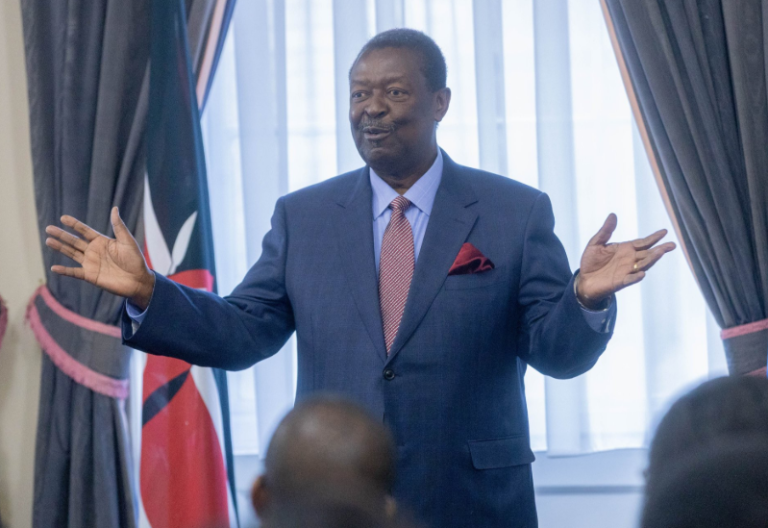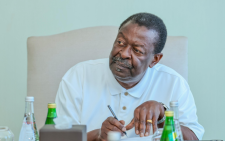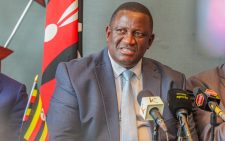Mudavadi calls for sanctions against leaders of armed groups in Sudan

Prime Cabinet Secretary Musalia Mudavadi has called on the international community to increase pressure, and even consider sanctions on the leaders of the several warring groups in Sudan who obstruct humanitarian aid.
Speaking at the London-Sudan Conference, at Lancaster House on Tuesday, April 15, 2025, Mudavadi said the priority should be on resolving the dire humanitarian situation facing the Sudanese population, and particularly, the vast areas that are not under the Sudan Armed Forces (SAF) control.
“We need to begin pressurizing or sanctioning and declaring clear consequences for those who continue to obstruct the work of humanitarian agencies,” said Mudavadi.
“The humanitarian situation continues to deteriorate, with a huge number of forced displacements, making Sudan the world’s largest internal displacement crisis. Those most affected are vulnerable Sudanese people, who can only stay where they are because they cannot afford to move to safer places internally and transnationally.”
According to Mudavadi, the human cost of the conflict had increased, and civilian protection was weak as populations continued to be victims of indiscriminate shootings and bombardments, women, and girls continued to face risks of conflict-related sexual violence, and children were subjected to widespread abuse and exploitation.
“We are deeply concerned about the plight of the displaced populations and will remain focused on supporting humanitarian assistance,” Mudavadi said.
He promised that Kenya will continue to facilitate the humanitarian supply logistics through the country, destined for the Sudanese people.
Mudavadi said while Kenya played its role to alleviate the suffering of the Sudanese people, he asked the international community to increase coordinated efforts to alleviate the humanitarian crisis.
“As a country, our long-held belief is that indifference to regional conflicts is never an option. Our security and prosperity are interlinked with that of our neighbors, making regional stability central to our foreign policy,” said Mudavadi.
“Further, bilaterally, Kenya has welcomed every key Sudanese stakeholder from both sides of the divide including top Sudan Armed Forces (SAF) and Rapid Support Forces (RSF) leaders, special envoys for the parties, representatives of local communities, civil society, political parties, and armed movements.”
Mudavadi revealed that Sudan’s Minister for Foreign Affairs Ali Youssef visited Nairobi in January 2025 and held meetings with President William Ruto and himself to seek a way forward on regional efforts to address the situation in Sudan.
“Equally, in February 2025, a group of political, civilian, and military Sudanese stakeholders held a meeting in Nairobi to agree on an organised unified structure that helps parties to engage and generate a common position to salvage Sudan,” said PCS.
Mudavadi has also denied reports that the Government of Kenya allowed formation of a parallel government for Sudan in Nairobi.
“Indeed, looking at the outcome documents of the meeting in Nairobi, we found that there was neither a parallel government nor a government in exile for Sudan that was formed in Nairobi. The reference to the right to self-determination in the Political Charter and Transitional Constitution is considered a democratic safeguard rather than a call for secession,” he said.
Mudavadi said that the Nairobi meeting was not a military or RSF-only conference, there were more than 24 political and civilian organization reflecting the diversity of Sudan.
“The conflict in Sudan may not end any time soon if we continue prioritizing military solutions. We need to start shifting focus from military attention to embrace a peace process that reflects the diversity of the Republic of Sudan. This includes bringing together the military groups, civilians, and political parties among other stakeholders,” said Mudavadi.
“We must start thinking about creating concrete structures that would address the root causes of the conflict, and usher in democracy and rule of law. We need to confront the challenge of multiple and parallel peace initiatives that impair commitment because parties engage in forum shopping opting to choose processes that suit their selfish interests rather than the common good.
Additional reporting by OPCS Press Services.














